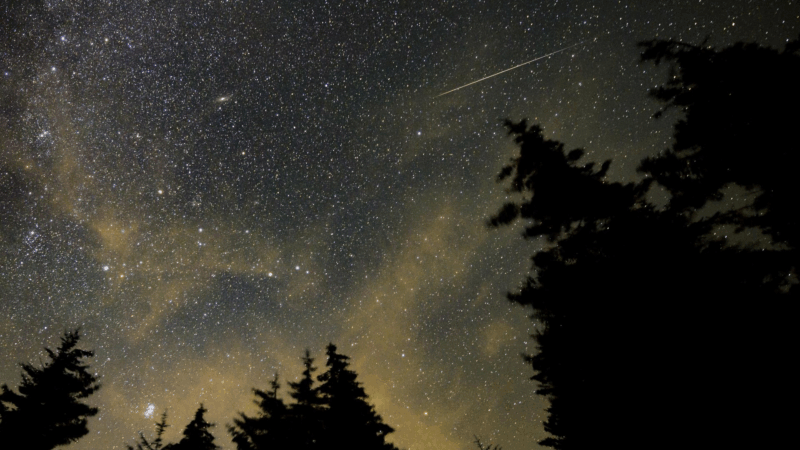Don’t wait for the Perseids in August — look for meteors this week
A ritual of summer is gazing up at the night sky in the hopes of seeing meteors, also known as shooting stars, flash across the night sky. While the annual Perseid meteor shower usually gets the most attention, a better bet might be a couple of less-famous meteor showers that will peak on Tuesday night.
That’s because this year, the bright moon may wash out the best part of the Perseids, which peak on Aug. 12. The moon will be a couple of days past full, which “just ruins the ability to see all of those meteors,” says Nick Moskovitz, a planetary astronomer with the Lowell Observatory in Arizona.
“The glare of the moon is really a killer,” he says, “and that is just going to make the Perseids not all that compelling this year.”
But the moon will be only about 25% full this week, when two meteor showers known as the Southern Delta Aquariids and the Alpha Capricornids reach their peak on the night of July 29 going into July 30.
Together, these two less-significant meteor showers might produce up to 20 to 30 meteors per hour, says Moskovitz.
Meteor showers occur when the orbiting Earth plows through a bunch of debris left behind by a comet or asteroid that’s also orbiting the sun. When tiny bits of rock hit our planet’s atmosphere, the friction produces a bright flash of light.
“It might look like this big bright streak across the sky, but those shooting stars are coming from bits of debris as small as pieces of dust, grains of sand,” says Hunter Miller, an astronomy educator with the Adler Planetarium in Chicago.
The best viewing will be in the early hours of the morning, after midnight and before dawn, says Moskovitz, adding that you need to find dark skies that aren’t affected by artificial light — and avoid the light sources we bring with us.
“Put your cellphone down,” he says. “Turn that screen off and let your eyes adjust to the dark.” It can take your eyes anywhere from 15 to 30 minutes to get adjusted enough to see dim, fleeting meteors.
To observe the Southern Delta Aquariids, says Moskovitz, people in North America should position themselves so that they have an unobstructed view of the southern part of the sky.
The Alpha Capricornids don’t produce frequent meteors, he says, “but when they do show up, they are these sort of slow fireballs across the sky. So if you are looking for that one spectacular event to happen during a watch session, an Alpha Capricornid may be the one that gets you the most excited.”
If your area has clouds on Tuesday night, you can try another day, because meteor showers occur not just on their peaks, but also in the days immediately before and after.
“This time of the summer is really peppered with meteor showers,” says Miller, pointing out that these events overlap each other over multiple weeks. “Really, my biggest recommendation is to get to dark skies.”
Miller thinks the Perseid meteor shower will still be worth trying to catch, despite the moon. While the bright moon will make it hard to see dim shooting stars, he says, the Perseids are “pretty well known for producing not only a large quantity of shooting stars, but also some particularly bright ones. So there’s still some good chances of seeing things this summer.”
Next year is predicted to be an excellent year for the Perseids, says Moskovitz, who notes that there’s a whole scientific community involved in meteor shower predictions because the satellite and spaceflight industries want to know how to best safeguard their assets from incoming space debris.
“For the Perseids, we think we have a pretty good understanding of how the activity varies from year to year, and forecasts have been relatively accurate,” says Moskovitz.
He says the forecast for 2026 calls for an “outburst,” or an unusually large number of meteors, and the moon will luckily be dark.
“As we get closer to that event and particularly after we see what this year’s looks like, we’ll be able to sort of pin down a bit better what that outburst could be,” Moskovitz says. “That one will be worth staying up for, I think. That one could be hundreds of meteors per hour.”
Judge rules 7-foot center Charles Bediako is no longer eligible to play for Alabama
Bediako was playing under a temporary restraining order that allowed the former NBA G League player to join Alabama in the middle of the season despite questions regarding his collegiate eligibility.
American Ben Ogden wins silver, breaking 50 year medal drought for U.S. men’s cross-country skiing
Ben Ogden of Vermont skied powerfully, finishing just behind Johannes Hoesflot Klaebo of Norway. It was the first Olympic medal for a U.S. men's cross-country skier since 1976.
An ape, a tea party — and the ability to imagine
The ability to imagine — to play pretend — has long been thought to be unique to humans. A new study suggests one of our closest living relatives can do it too.
How much power does the Fed chair really have?
On paper, the Fed chair is just one vote among many. In practice, the job carries far more influence. We analyze what gives the Fed chair power.
This complex brain network may explain many of Parkinson’s stranger symptoms
Parkinson's disease appears to disrupt a brain network involved in everything from movement to memory.
‘Please inform your friends’: The quest to make weather warnings universal
People in poor countries often get little or no warning about floods, storms and other deadly weather. Local efforts are changing that, and saving lives.








